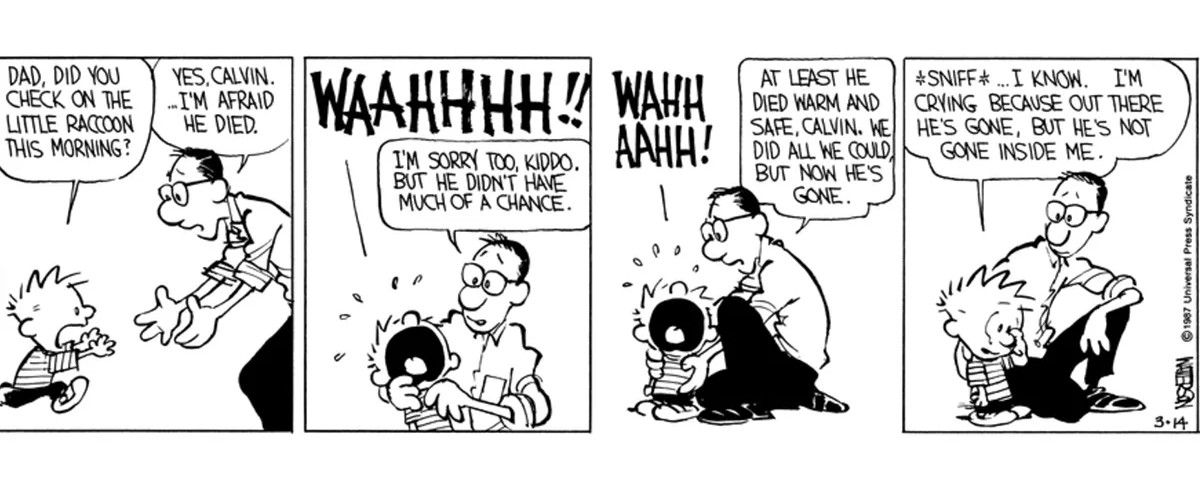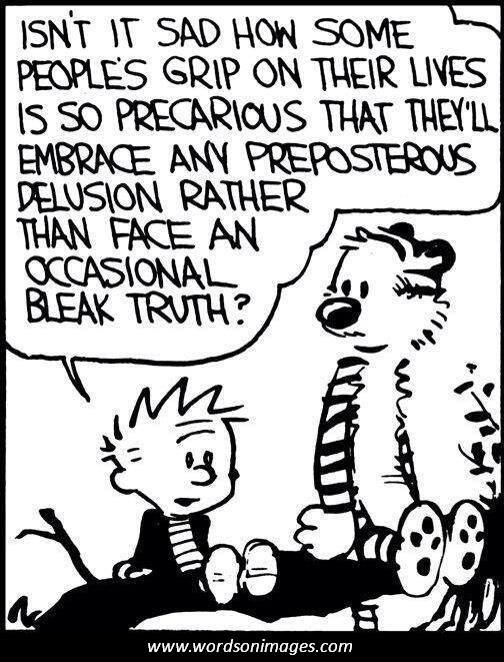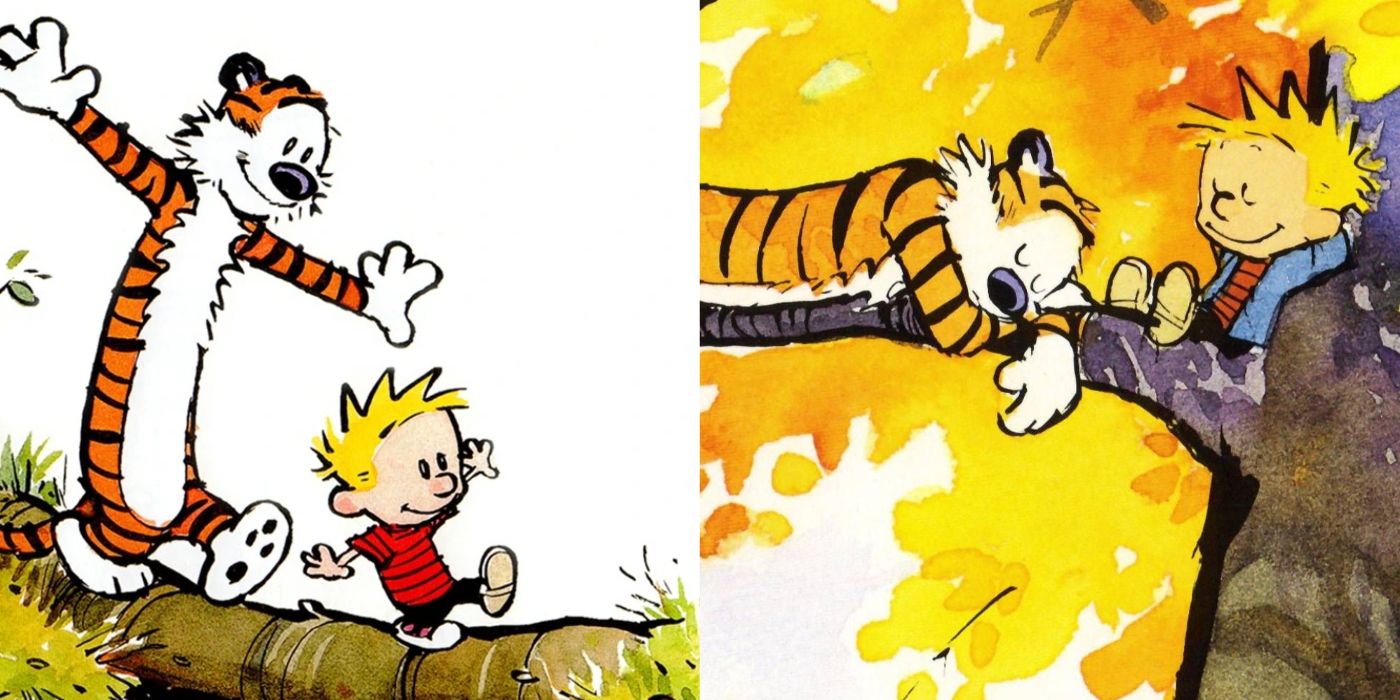Calvin And Hobbes Existentialism: A Playful Dive Into Life's Big Questions
There's something magical about Calvin and Hobbes that goes beyond mere cartoons. It's a world where a boy and his tiger explore life's deepest questions with boundless imagination. This isn't just a comic strip; it's a philosophical journey. Bill Watterson's creation has become a timeless classic because it doesn't shy away from existentialism. So, buckle up as we dive into the fascinating world of Calvin and Hobbes and uncover the layers of existential meaning hidden within their adventures.
At first glance, Calvin and Hobbes might seem like simple tales of childhood fun. But dig a little deeper, and you'll find a treasure trove of existential wisdom. Through the eyes of a six-year-old boy and his stuffed tiger, Watterson explores life's biggest questions. It's not just about playing make-believe; it's about finding meaning in a chaotic world.
This article is your ticket to understanding how Calvin and Hobbes existentialism shapes our view of life. We'll explore the philosophical underpinnings of these beloved characters and how they tackle complex ideas in a way that's both relatable and profound. So, let's get started!
Read also:Big Ass Stadium Tour Setlist Your Ultimate Guide To The Rocking Experience
Understanding Calvin and Hobbes: More Than Just a Comic Strip
Bill Watterson's creation is more than just a comic strip. Calvin and Hobbes exist as a philosophical playground where imagination meets reality. Through their adventures, we see a child's unfiltered view of the world, a view that often mirrors our own existential dilemmas. The beauty of these comics lies in their ability to blend humor with deep thought, making them accessible yet thought-provoking.
Who Are Calvin and Hobbes?
Calvin is a precocious six-year-old with an overactive imagination. His companion, Hobbes, is a stuffed tiger who, in Calvin's world, is as real and alive as any other person. Together, they embark on adventures that range from battling dinosaurs to pondering the meaning of life. Their interactions are a delightful mix of playfulness and philosophical musings, making them a perfect vehicle for exploring existential themes.
Calvin and Hobbes Existentialism: Breaking It Down
Existentialism in Calvin and Hobbes isn't as daunting as it sounds. It's about exploring life's big questions through the eyes of a child. Calvin's world is filled with wonder and curiosity, and his adventures often touch on existential themes without being heavy-handed. This approach makes the philosophy accessible and relatable to readers of all ages.
Key Themes in Calvin and Hobbes Existentialism
- Freedom and Choice: Calvin often finds himself in situations where he must make choices, reflecting the existential idea that we are free to shape our own destinies.
- Identity and Self-Perception: Through his various alter egos, Calvin explores different facets of his identity, questioning who he truly is.
- Meaning and Purpose: Many strips delve into the search for meaning in a seemingly chaotic world, a central tenet of existential thought.
The Role of Imagination in Calvin and Hobbes
Imagination plays a crucial role in Calvin and Hobbes existentialism. It's through his boundless creativity that Calvin grapples with life's complexities. Whether he's fighting off Spacemen or pondering the nature of time, his imagination provides a lens through which to view the world. This creative freedom allows for a deeper exploration of existential ideas, making them more tangible and relatable.
How Imagination Shapes Existential Thought
Imagination in Calvin and Hobbes isn't just about play; it's a tool for understanding. By creating alternate realities, Calvin can test different ideas and perspectives. This process mirrors the existentialist belief that we must actively engage with the world to find meaning. It's not about accepting things as they are but about questioning and exploring possibilities.
Calvin and Hobbes Existentialism in Everyday Life
Existentialism in Calvin and Hobbes isn't confined to the pages of a comic strip. It has real-world applications that can help us navigate our own lives. By embracing the curiosity and openness of Calvin, we can approach life's challenges with a sense of wonder and purpose. This mindset encourages us to question, explore, and find meaning in our everyday experiences.
Read also:Unlocking The Secrets Of The Paxon North Loop Your Ultimate Guide
Practical Applications of Existential Thought
- Encouraging Curiosity: Like Calvin, we can approach life with a sense of wonder, asking questions and seeking answers.
- Embracing Freedom: Recognizing our ability to make choices and shape our own destinies can empower us to take control of our lives.
- Finding Meaning: By exploring different perspectives, we can uncover the meaning and purpose in our own lives.
The Influence of Calvin and Hobbes on Modern Philosophy
Calvin and Hobbes existentialism has had a lasting impact on modern philosophy. Bill Watterson's work has inspired countless thinkers and writers to explore complex ideas in accessible ways. By using humor and imagination, Watterson has shown that philosophy doesn't have to be dry or inaccessible. This approach has opened the door for a new generation of thinkers to engage with existential thought.
Watterson's Legacy in Philosophy
Bill Watterson's influence extends beyond the comic strip. His work has become a touchstone for those interested in existentialism, offering a fresh perspective on timeless questions. By blending philosophy with humor, Watterson has created a legacy that continues to inspire and challenge readers to this day.
Data and Statistics: The Popularity of Calvin and Hobbes
Calvin and Hobbes has achieved widespread popularity, with millions of fans around the world. According to various surveys, it remains one of the most beloved comic strips of all time. This popularity is a testament to its ability to resonate with readers on a deep, philosophical level. The strip's exploration of existential themes has struck a chord with audiences, proving that philosophy can be both entertaining and enlightening.
Why Calvin and Hobbes Resonates with Readers
The universal appeal of Calvin and Hobbes lies in its ability to connect with readers on a personal level. Whether you're a child or an adult, the strip's exploration of life's big questions speaks to the human experience. This connection is what makes Calvin and Hobbes existentialism so powerful and enduring.
Calvin and Hobbes Existentialism: A Call to Action
So, what can we learn from Calvin and Hobbes existentialism? First and foremost, it teaches us to embrace curiosity and wonder. By questioning the world around us, we can uncover deeper truths and find meaning in our lives. It also reminds us of the importance of imagination and creativity in our quest for understanding.
How to Apply These Lessons in Your Life
- Stay Curious: Never stop asking questions and seeking answers.
- Embrace Creativity: Use your imagination to explore new ideas and perspectives.
- Find Meaning: Actively seek purpose in your everyday experiences.
Conclusion: The Enduring Legacy of Calvin and Hobbes
In conclusion, Calvin and Hobbes existentialism offers a unique perspective on life's biggest questions. Through the eyes of a child and his tiger, we can explore complex ideas in a way that's both relatable and profound. This philosophical journey is a reminder that life is full of wonder and possibility, and that we have the power to shape our own destinies.
So, the next time you find yourself pondering life's mysteries, remember Calvin and Hobbes. Let their adventures inspire you to embrace curiosity, creativity, and the search for meaning. And don't forget to share this article with your friends and family. After all, the more we explore these ideas together, the richer our understanding becomes.
Table of Contents
Article Recommendations


